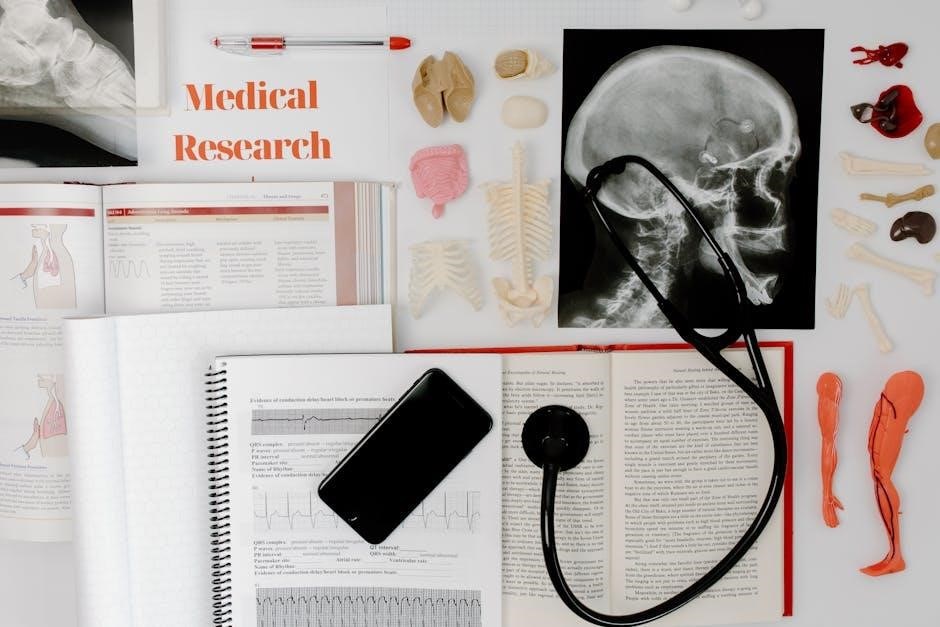Welcome to the AQA A Level Chemistry course‚ a comprehensive and challenging qualification that explores the fundamental principles of chemistry. This textbook is designed to support students through their studies‚ providing detailed explanations‚ practical skills‚ and synoptic links to ensure success in exams and beyond.
1.1 Overview of the AQA A Level Chemistry Course
The AQA A Level Chemistry course is a comprehensive qualification that blends theoretical knowledge with practical skills‚ preparing students for advanced study and careers in science. It covers core topics such as atomic structure‚ thermodynamics‚ and organic chemistry‚ while emphasizing synoptic links to connect concepts across the curriculum. The course is divided into two years‚ with Year 1 focusing on foundational principles and Year 2 building on this knowledge with more complex themes. Practical skills are integrated throughout‚ ensuring students develop lab expertise and problem-solving abilities. The textbook supports this structure‚ offering clear explanations‚ diagrams‚ and activities to enhance understanding and exam readiness.
1.2 Importance of the AQA A Level Chemistry Textbook
The AQA A Level Chemistry textbook is an essential resource for students‚ providing comprehensive coverage of the curriculum. It offers clear explanations‚ detailed diagrams‚ and practical activities to support learning. The textbook is written by experts‚ ensuring accuracy and alignment with the AQA specification. It includes synoptic links and questions‚ helping students connect concepts and prepare for exams. Additionally‚ it supports independent study‚ allowing students to develop their knowledge and skills outside the classroom. Regular use of the textbook enhances understanding‚ boosts confidence‚ and equips students with the tools needed to excel in their A Level Chemistry studies.

Structure of the AQA A Level Chemistry Course
The AQA A Level Chemistry course is divided into two years‚ with Year 1 covering foundational topics and Year 2 building on this knowledge. It includes synoptic assessment and practical skills development‚ ensuring a well-rounded understanding of chemistry concepts and their applications.
2.1 Year 1 and AS Level Content
Year 1 of the AQA A Level Chemistry course introduces foundational concepts‚ including atomic structure‚ bonding‚ and chemical changes. Students explore topics like thermodynamics‚ kinetics‚ and organic chemistry‚ with a focus on developing practical and analytical skills. The AS Level content is seamlessly integrated‚ ensuring a smooth transition for students. The curriculum emphasizes the development of scientific literacy and problem-solving abilities‚ preparing students for more advanced topics in Year 2. Practical work is embedded throughout‚ with required practicals designed to enhance experimental skills and understanding.
2.2 Year 2 Content
Year 2 of the AQA A Level Chemistry course builds on the foundational knowledge from Year 1‚ delving into advanced topics such as biochemistry‚ polymers‚ and advanced organic chemistry. Students explore complex concepts like nuclear chemistry‚ electrochemistry‚ and the chemistry of the atmosphere. The curriculum emphasizes the application of chemical principles to real-world scenarios‚ fostering deeper understanding and critical thinking. Practical skills are further refined‚ with a focus on synoptic assessment‚ requiring students to integrate knowledge from across the course. The textbook provides comprehensive coverage‚ ensuring students are well-prepared for the challenges of A Level exams.
2.3 Synoptic Assessment and Practical Skills

Synoptic assessment in AQA A Level Chemistry requires students to integrate knowledge from across the curriculum‚ ensuring a holistic understanding of chemical concepts. The textbook includes dedicated sections with synoptic links and questions‚ helping students connect topics and apply their knowledge effectively. Practical skills are a cornerstone of the course‚ with 12 required practicals that develop experimental techniques and data analysis abilities. These skills are essential for success in both the practical endorsement and the theoretical exams‚ preparing students for higher education and future careers in science.
Key Features of the AQA A Level Chemistry Textbook
The AQA A Level Chemistry textbook offers comprehensive curriculum coverage‚ practical skills development‚ and synoptic links. It includes clear explanations‚ diagrams‚ and mathematical support to enhance learning and exam preparation.

3.1 Comprehensive Coverage of the Curriculum
The AQA A Level Chemistry textbook provides a thorough exploration of all topics within the curriculum‚ ensuring students grasp both foundational and advanced concepts. From atomic structure to organic chemistry‚ each module is detailed with clear explanations and relevant examples; The textbook aligns seamlessly with the AQA specification‚ covering Year 1 and Year 2 content‚ including practical skills and synoptic themes. This comprehensive approach ensures that students are well-prepared for both AS and A Level exams‚ with a strong emphasis on understanding and applying chemical principles effectively.
3.2 Practical Skills and Required Practicals
The AQA A Level Chemistry textbook places a strong emphasis on developing practical skills‚ aligning with the required practicals outlined in the curriculum. Students are guided through experimental investigations‚ with detailed activities and assessments to enhance their hands-on experience. The textbook includes comprehensive coverage of all 12 required practicals‚ ensuring students are well-prepared for both AS and A Level exams. Clear explanations and diagrams support the development of practical skills‚ while synoptic links help students connect theoretical knowledge with practical applications‚ fostering a deeper understanding of chemical principles and experimental techniques.
3.3 Synoptic Links and Questions
The AQA A Level Chemistry textbook includes dedicated synoptic links and questions to help students connect different areas of the curriculum. These resources are designed to prepare students for synoptic assessment‚ ensuring they can apply their knowledge across multiple topics. The textbook features a dedicated section for synoptic questions‚ allowing students to practice and refine their ability to integrate concepts. This approach supports deeper understanding and exam readiness‚ making it an essential tool for mastering the synoptic aspects of the AQA Chemistry course.
3.4 Mathematical and Problem-Solving Support
The AQA A Level Chemistry textbook provides robust mathematical and problem-solving support‚ ensuring students can tackle complex calculations and apply chemical principles effectively. With worked examples‚ practice questions‚ and detailed explanations‚ the textbook helps students build confidence in their mathematical skills. It covers essential areas such as stoichiometry‚ thermodynamics‚ and kinetics‚ with a focus on real-world applications. This comprehensive support enables students to approach problems methodically‚ reinforcing their understanding and preparing them for challenging exam questions.

Benefits of Using the AQA A Level Chemistry Textbook
The AQA A Level Chemistry textbook offers comprehensive coverage‚ practical skills development‚ and synoptic links‚ providing students with a robust foundation for exam success and independent learning.
4.1 Support for Independent Study
The AQA A Level Chemistry textbook is designed to foster independent learning‚ offering clear explanations‚ diagrams‚ and practical activities. It covers all required skills and knowledge‚ making it ideal for self-study. The book includes synoptic links and dedicated sections for synoptic questions‚ helping students connect topics and prepare for exams. With comprehensive coverage of the curriculum‚ it supports students in developing a deep understanding of chemistry. Available in both physical and digital formats‚ the textbook provides flexibility for students to study at their own pace‚ reinforcing their ability to learn independently and effectively.
4.2 Clear Explanations and Diagrams

The AQA A Level Chemistry textbook excels in providing clear‚ concise explanations and detailed diagrams to aid student understanding. Complex concepts are broken down into manageable sections‚ supported by visual aids that illustrate key processes and structures. The textbook’s accessible language ensures that students can grasp challenging topics without confusion. Diagrams are strategically placed to complement explanations‚ making abstract ideas more tangible. This combination of clarity and visual support enhances learning‚ enabling students to build a strong foundation in chemistry and apply their knowledge effectively in exams and practical scenarios.
4.3 Progress Tracking and Assessment Preparation
The AQA A Level Chemistry textbook includes features that help students track their progress and prepare effectively for assessments. Regular checkpoints and self-assessment questions allow learners to identify areas for improvement. Practice questions and past paper excerpts familiarize students with exam formats‚ while detailed mark schemes provide insights into examiners’ expectations. The textbook also offers guidance on exam technique‚ ensuring students can apply their knowledge confidently. These tools empower students to monitor their development and approach exams with confidence‚ making the textbook an invaluable resource for achieving success in A Level Chemistry.
Comparison with Other A Level Chemistry Resources
The AQA A Level Chemistry textbook stands out for its comprehensive coverage and practical support‚ offering more detailed explanations and synoptic links compared to CGP and Oxford resources.
5.1 CGP A Level Chemistry Books
CGP A Level Chemistry books are popular for their clear explanations and extensive practice questions‚ making them a valuable resource for students. They cover the AQA syllabus comprehensively‚ offering detailed notes and practical examples. While they are excellent for revision and practice‚ some users find them less detailed compared to the official AQA textbook. CGP books are particularly praised for their accessibility and focus on exam skills‚ making them a great supplement to the main textbook. However‚ for in-depth understanding‚ combining CGP with the AQA textbook is often recommended.
5.2 Oxford A Level Chemistry Textbooks
Oxford A Level Chemistry textbooks are renowned for their detailed explanations and comprehensive coverage of the AQA syllabus. They provide in-depth analysis of complex topics‚ making them ideal for students seeking a thorough understanding. These books are particularly strong in areas like mathematical support and practical skills‚ offering clear examples and worked solutions. While they are more dense than CGP books‚ they are highly regarded for their accuracy and depth. Students often use them alongside other resources for a well-rounded study approach‚ ensuring they cover all aspects of the curriculum effectively.
5.3 Online Resources and Digital Tools
How to Use the AQA A Level Chemistry Textbook Effectively
Set clear goals‚ engage in active reading‚ and integrate practical activities. Regularly review and track progress to identify and focus on weak areas for improved understanding and retention.
6.1 Study Tips for Maximizing Learning
To maximize learning‚ adopt active reading strategies by highlighting key concepts and taking detailed notes. Focus on understanding practical skills and synoptic links‚ as these are crucial for exams. Use the textbook’s clear explanations and diagrams to visualize complex topics. Regularly review and summarize chapters to reinforce memory. Engage with past papers and online resources like Chem revise to apply knowledge. Prioritize weak areas and seek additional support through CGP revision guides or online forums. Consistency and structured study plans will ensure steady progress and confidence in mastering AQA A Level Chemistry.
6.2 Integrating the Textbook with Other Study Materials
Combine the AQA A Level Chemistry textbook with additional resources like CGP revision guides‚ past papers‚ and online tools for a well-rounded study approach. CGP books offer concise summaries and practice questions‚ while past papers help familiarize yourself with exam formats. Online platforms like Chem revise provide interactive notes and questions to supplement textbook content. Use flashcards for key terms and concepts‚ and integrate digital tools for accessible learning. Organize your materials by topic and cross-reference them regularly to reinforce understanding and ensure no gaps in your knowledge. This integrated approach maximizes learning efficiency and exam preparation.

6.3 Focusing on Weak Areas and Revision
Identify and address weak areas by regularly reviewing challenging topics in the AQA A Level Chemistry textbook. Use the textbook’s synoptic links and practice questions to reinforce understanding. Supplement with CGP revision guides for concise summaries and past papers for exam practice. Focus on required practicals and mathematical skills‚ as these are often critical areas. Create detailed notes and flashcards for key concepts. Regularly test yourself on weak topics and seek feedback to track progress. By systematically addressing gaps and revisiting difficult sections‚ you can build confidence and achieve a deeper understanding of the curriculum.
Accessing the AQA A Level Chemistry Textbook
7.1 Purchasing the Physical Book
The AQA A Level Chemistry Student Book can be purchased in physical format from online retailers like Amazon. It is available with ISBN 9780198351825‚ ensuring easy identification. This textbook is specifically designed for students following the AQA syllabus‚ covering all necessary skills and knowledge. It supports independent study and includes practical and synoptic skills development. The physical book is ideal for hands-on learning‚ with clear explanations and diagrams; Students can also find it on platforms like CGP Books and other educational suppliers‚ making it widely accessible for AS and A Level preparation.
7.2 Downloading the PDF Version

The AQA A Level Chemistry Student Book is also available as a PDF‚ offering a convenient digital alternative. Students can download the PDF version from platforms like Amazon or educational websites. Ensure the PDF is from a reputable source‚ such as the publisher or authorized sellers‚ to maintain quality and accuracy. The PDF version is ideal for digital learners‚ allowing easy access on devices like tablets or laptops. It retains all the content of the physical book‚ including synoptic links‚ practical activities‚ and mathematical support‚ making it a versatile option for independent study and revision.
7.3 Using Online Platforms and eBooks

Additional Resources for AQA A Level Chemistry
Supplement your studies with revision guides‚ workbooks‚ and past papers. Online forums and communities offer peer support and expert advice‚ enhancing your learning experience effectively.
8.1 Revision Guides and Workbooks
Revision guides and workbooks are essential companions for AQA A Level Chemistry students. CGP’s Complete Revision & Practice books offer concise notes‚ exam-style questions‚ and practical tips‚ while Oxford’s guides provide detailed explanations. These resources help students identify weak areas‚ with focused exercises to improve understanding. Workbooks often include practice papers and mark schemes‚ enabling self-assessment. They complement the textbook by offering alternative perspectives and reinforcing key concepts. Regular use of these tools ensures thorough preparation for exams‚ fostering confidence and mastery of the curriculum.
8.2 Past Papers and Mark Schemes
Past papers and mark schemes are invaluable resources for AQA A Level Chemistry students. They provide authentic exam questions‚ allowing students to practice under timed conditions and familiarize themselves with the exam format. Mark schemes offer detailed explanations of correct answers‚ helping students understand how to score maximum marks. Regularly practicing past papers improves time management‚ question-answering techniques‚ and overall exam confidence. These resources are widely available on the AQA website‚ educational platforms‚ and revision guides‚ making them accessible for self-assessment and targeted improvement.
8.3 Online Communities and Forums
Online communities and forums are excellent resources for AQA A Level Chemistry students seeking support and discussion. Platforms like Reddit’s r/sixthform‚ student forums‚ and specialized chemistry groups allow students to ask questions‚ share resources‚ and gain insights from peers and teachers. These spaces often feature discussions on challenging topics‚ study tips‚ and exam strategies. Many forums also host collaborative revision sessions or resource exchanges‚ such as past papers and notes. While not a replacement for textbooks‚ these communities provide valuable supplementary support and foster a sense of camaraderie among students navigating the A Level journey.
Exam Preparation and Revision Strategies
Effective exam preparation involves creating a structured study plan‚ utilizing flashcards for key terms‚ and regularly practicing past exam questions. Summarizing notes and understanding mark schemes enhances retention and application of concepts‚ ensuring readiness for synoptic assessments and practical evaluations.
9.1 Timetabling and Organized Study Plans
Creating a detailed timetable is essential for effective exam preparation. Allocate specific time slots for each topic‚ ensuring balanced coverage of all areas. Break study sessions into manageable chunks‚ focusing on key concepts and required practicals. Use the AQA Chemistry textbook to guide your schedule‚ prioritizing weak areas. Regularly review and adjust your plan to stay on track. Integrate online resources‚ such as Chem revise and Physics and Maths Tutor‚ to supplement your learning. Consistency and organization are key to mastering the curriculum and achieving exam success.
9.2 Effective Use of Flashcards and Summarized Notes
Flashcards and summarized notes are powerful tools for active recall and retention. Create flashcards focusing on key terms‚ reactions‚ and concepts from the AQA Chemistry textbook. Use them for quick revision sessions‚ testing yourself on definitions and processes. Summarized notes condense complex topics into concise points‚ making them ideal for last-minute reviews. Combine these with practice questions from the textbook to reinforce understanding. Regularly review and update your notes to ensure clarity and accuracy‚ helping you stay confident and prepared for exams.
9.3 Practicing Past Exam Questions
Practicing past exam questions is essential for mastering AQA A Level Chemistry. Use past papers and mark schemes from the AQA textbook to familiarize yourself with exam formats and question types. Regular practice helps improve time management‚ application of knowledge‚ and problem-solving skills. Focus on weak areas identified through practice and review explanations to address gaps. Utilize online resources like CGP books and Chem Revise for additional questions. Analyze mark schemes to understand examiners’ expectations and refine your answers. Consistent practice with past papers builds confidence and ensures readiness for the actual exams.
The AQA A Level Chemistry textbook is a valuable resource‚ offering comprehensive coverage‚ practical skills‚ and synoptic support to aid students in their academic journey and exam preparation.
10.1 Final Thoughts on the AQA A Level Chemistry Textbook
The AQA A Level Chemistry textbook is an indispensable resource for students‚ providing a thorough understanding of the curriculum. Its clear explanations‚ practical guidance‚ and synoptic links ensure comprehensive preparation for exams. The inclusion of required practicals and mathematical support enhances learning‚ making it a well-rounded tool. Students can rely on this textbook to build a strong foundation in chemistry‚ develop critical thinking‚ and achieve academic success. It is a recommended companion for both independent study and classroom learning‚ catering to diverse learning styles and needs.
10.2 Encouragement for Students to Utilize the Textbook
Students are strongly encouraged to make full use of the AQA A Level Chemistry textbook‚ as it is a valuable resource tailored to their learning needs. Its comprehensive coverage‚ practical guidance‚ and synoptic links provide a solid foundation for understanding complex concepts. Regular use of the textbook supports independent study‚ helping students develop a deeper grasp of chemistry. By engaging with the material consistently‚ students can build confidence‚ improve problem-solving skills‚ and achieve their academic goals. Embrace this tool to enhance your learning journey and excel in your A Level Chemistry studies.

Staying Updated with the AQA A Level Chemistry Curriculum
Regularly check the AQA website for specification updates and engage with teacher and student communities to stay informed about curriculum changes and resource developments.
11.1 Checking for Specification Updates
Staying updated with the AQA A Level Chemistry curriculum is crucial for success. Regularly visit the official AQA website to check for specification updates‚ amendments‚ and new resources. These updates often include changes in content‚ assessment methods‚ or practical requirements. Additionally‚ utilize the AQA Chemistry A Level Textbook PDF and related resources‚ such as the CGP revision guides‚ to ensure alignment with the latest curriculum. Engaging with teacher and student forums can also provide insights into recent developments and effective study strategies. Proactive monitoring ensures students and teachers are well-prepared for exams and continuous learning.
11.2 Engaging with Teacher and Student Communities
Engaging with teacher and student communities is vital for staying updated and gaining insights into the AQA A Level Chemistry curriculum. Online forums‚ social media groups‚ and educational platforms provide spaces for discussion and resource sharing. Communities like Reddit’s r/sixthform or Facebook groups dedicated to A Level Chemistry offer peer support and advice. Teachers often share tips and resources‚ while students exchange study strategies and materials. Participating in these networks can enhance understanding‚ clarify doubts‚ and provide access to shared resources like the AQA Chemistry A Level Textbook PDF and revision guides‚ fostering a collaborative learning environment.
